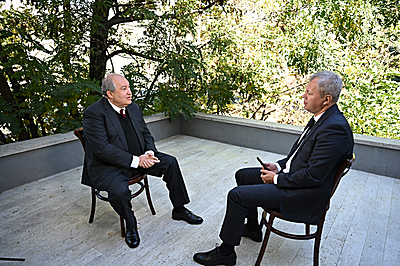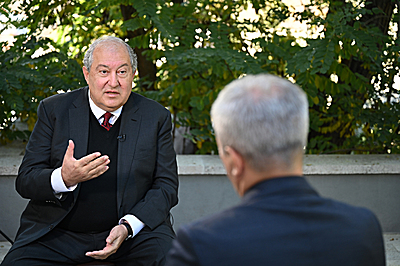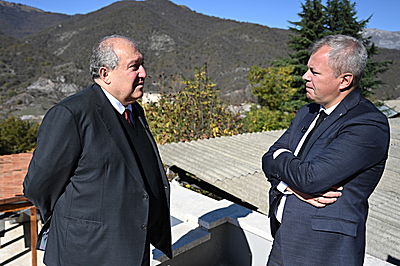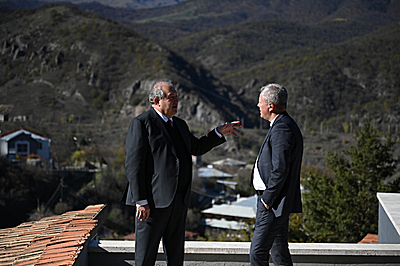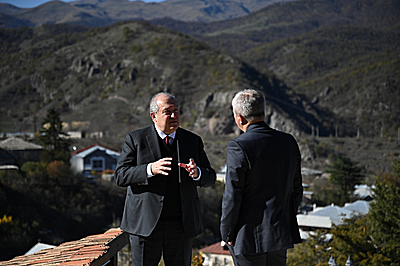Interviews and press conferences
Relations between Armenia and Russia are an axiom, and they do not need proving. The exclusive interview of President Armen Sarkissian to the RBC TV Channel
The President of the Republic Armen Sarkissian gave an exclusive interview to Ilya Doronov, the General Director of the Russian RBC TV Channel.
Ilya Doronov - Armen Vardanovich, thank you for giving an interview and hosting us in Dilijan, which is a beautiful city.
- Is this your first time here?
Ilya Doronov: Yes, we have never been here before.
We are meeting at a time that, in fact, nearly coincides with marking one year of the end of the war about a year ago. What lessons do you think Armenia has learned from what happened during this year?
- It is difficult to say what lessons, as it takes time, even a year is not enough. Every war brings tragedy, but it was a double tragedy because of the coronavirus spreading all over the world. In such great, global tragedies, we as human beings living on this planet need to cooperate, talk to each other more than fight. All this reminds me of The Jungle Book by Kipling when there is a fire in the jungle or shortage of water, even the animals gather near the spring and do not fight.
All this was really very tragic. At the same time, we were losing mostly young lives.
We will be able to discuss the real lessons ten or twenty years later when the the true history will be written. One thing was clear: in that war, Armenia was not ahead of Azerbaijan, it was behind in military-technical readiness.
Ilya Doronov: This time, you came in contact with unmanned aerial vehicles.
- When I say behind, I mean we should have had our UAVs because Azerbaijan mainly used Turkish and Israeli UAVs. Armenia should have prepared for such a war, a war of the 21st century.
Ilya Doronov: Armenia was behind; but why did it fall behind? Because everyone was sure that they could win at any moment, recalling the 1990s?
- It is a much more fundamental and difficult issue because, in general, there is such a tendency all over the world today: we are pretending. We pretend that we are doing something; we pretend that we have democracy (I am not talking about Armenia, but in general); we pretend that we have a very high level of science..․But the worst thing is when we start believing everything we pretended to have and to have done. We assure ourselves, and that it is very dangerous.
Yes, Armenia won in the first war. And what does it mean historically? Twenty-six years passed, and during those twenty-six years, it was possible to create a strong army and strengthen our economy; the relations between Russia and Armenia should have raised to an absolutely different level. I am not saying these relationships are bad; however, as always in my life, if I achieved anything, I strove for the more, and the same way, I have inspired my children and my students, to go further.
Ilya Doronov: Is it clear what needs to be improved?
- It is. First, one should perceive that Armenian-Russian relations are a special theme. Let me explain it from a scientific viewpoint.
You build a mathematical theory on certain things. First, it is built on axioms. If we look at the relations between Armenia and Russia in such a mathematical context, it is an axiom. These relations have existed for several centuries and do not need to be proven.
Armenians lived in the Russian Empire, and Armenians lived in the Ottoman Empire. What is left of the Armenians who lived in the Russian Empire, the independent Republic of Armenia, and Armenians who live safely throughout the territory of the Russian Federation, from Kaliningrad to Vladivostok. That is why the Armenian-Russian relations are an axiom.
Armenia's relations with other countries are theories to prove. Proving these theories is time-consuming, with rises and falls in relations, and must be proven every time.
We can really be happy with what we have. I think the potential for the development of true, daily, economic, political, and military-political relations is significant, even though you say that Russia is an enormous country, and Armenia is small.
Ilya Doronov: You say that the world is changing. What does it become?
- The world has become very fast, everything is changing very fast. For many, it has become unpredictable. The world has become incomprehensible; many international organizations and laws that used to work, do not work today. For many, the world has not only become unpredictable, but also the sense of danger has grown. The world has become not only unpredictable, but also very rapidly changing.
Ilya Doronov: Have you not thought that we lived so long that now we reached a point where everything we have lived through is a thing of the past?
- We have not noticed those changes. I started thinking about this in 2001-2002 when I declared in Davos that the world was changing. It was then that I first spoke about the fact that the world has become quantum. I said this is not the classic world we used to live in. At that time, everyone was talking about a new industrial revolution, and now, we live in a period that I do not call the 4th or 5th industrial revolution, but R-evolution, i.e., Rapid Evolution. We live in an age where evolution is happening every day. See how fast information technology is evolving, how much information we collect. All this is growing exponentially.
Ilya Doronov: When I was preparing for the interview, I wrote down a question, and it turned out that I thought about it while you were arguing with Romano Prodi. Don't you think that Armenia is approaching, as they say in English, the status of a failed state? Romano Prodi spoke about the fact that soon small countries and states must decide with whom they are and comprise part of other states.
- You rightly mentioned that I was arguing with him, which was a friendly debate.
I do not agree with him at all, I do not agree with your statement either. Quite the opposite. What happened after the war… You are not the first to say that Armenia is a failed country, uncontrollable. It was easy to understand as it was the first days, it was incomprehensible, there was confusion, everything got to the point where the General Staff started to publish some ideas, I entered that structure for the first time during my three years of presidency (I am the President of a Parliamentary Republic and of course, I do not lead the army, but I had to go there) and have a serious conversation with the generals. I cannot, of course, provide details of that meeting. In other words, such crises had to be overcome.
However, on the other hand, I stated from the first day that the solution to that difficult moment must be found through elections. My suggestion was simple: first, we should have a professional government that would not support this or that force, and secondly, we should have worked to change the Constitution.
Ilya Doronov: Yes, we talked about it in March.
- Constitutional amendments do not imply a transition from an unbalanced parliamentary system to an unbalanced presidential system. No. If we want a parliament, then the government must be balanced.
Ilya Doronov: As far as I understand the issue of the Constitution, I have recently communicated with the Speaker of the Parliament, is not a priority. He said that they will think about it ...
- Let me finish. It's not going to make much difference if we replace one unbalanced system with another. I would prefer to return to the presidential system, for a simple reason. Our society lived in the Russian Empire, in the Soviet Union, and had three presidents, it is very difficult for them to understand the concepts of the parliamentary system of government.
But in any case, whether presidential or parliamentary, the balance of power is very important. When I talk about changing the Constitution, I do not mean myself at all. In any case, if we change the Constitution, it will start working with the election of the next president.
If we make such a decision, and adopt a new Constitution, I am ready to resign at once to show people that it is not for me or my power, but to make things easier and better in our country; and when the country experiences hard times, it should be clear who is responsible and who makes the decisions.
We had elections, and we did not change the Constitution. I had discussions with the Prime Minister and the oppositional parties on the elections, and they took place. And what happened after the elections? Tensions on the street dropped sharply. But today, there is tension among the parliamentarians. It is normal that the tension is in the parliament, but it is not normal when it was in the streets. For me, as the president of the country, it is essential that there is no tension in the streets, and there is no tension among the politicians and in the army. For me, as President, it is vital that the situation is calm and stable in the streets. Today, the streets in Yerevan are calm and stable. Will that calm continue forever? No.
Ilya Doronov: No because Robert Kocharyan declared that there will be rallies from the next week.
- Robert Kocharyan declared... You know what, announcing is one thing, street... There have been elections, and please, there are the results. The current political force, the party is in the parliament, they can also work there ... In any case, the tension has sharply decreased.
Ilya Doronov: So, after those parliamentary elections, the important thing for you is that the tension has decreased?
- Yes, the tension has decreased. There are concrete things. The people have given a mandate to the government to solve the problems related to the economy, statistics, taxes, and everything else. Our young boys are still in Azerbaijan! This is completely abnormal. There are problems with demarcation, issues related to the future relations between Armenia and Azerbaijan. These are issues that the government needs to address. The people gave him a mandate.
Ilya Doronov: Why are the captives still in Azerbaijan a year later?
- You should not ask me that question.
Ilya Doronov: Yes, I understand ...
- You must first ask that question to Azerbaijan. I remember in 1994, after the first war, all the prisoners of war who were in Armenia and Karabakh returned to Azerbaijan. Why did Azerbaijan decide not to do this today and make some kind of trials and performances out of it, to use human lives, the lives of young people to solve certain problems?
You should ask that question first to Azerbaijan, this question is not about the Armenian-Azerbaijani relations, but it is at the level of human relations because even during the big wars, the parties exchange prisoners.
This issue is also in the domain of the international community. As President, I have appealed to the UN, the Council of Europe, NATO, everyone for the return of the captives. And why is there no result? Perhaps, there are several reasons. The first is that international organizations may not be as effective or respected, as they were, thirty years ago. But talking about the future of the UN, NATO and other international organizations is another theme. Second, it is possible that Azerbaijan disregards international organizations.
Ilya Doronov: Can Russia help?
- Russia can always help in any issue.
Ilya Doronov: A year ago, we talked on Turkey's coming to the region again, it supports Azerbaijan a lot. What trends do you see in a year? Has Turkey calmed down?
- Has Turkey calmed down? I cannot make such a diagnosis. In fact, nothing has changed in Turkey's strategy because the war in the South Caucasus was not the only one connected with Turkey. It is part of a larger regional and global policy. Let us remember: Where Turkey is, and why did it enter Libya? Why is it so active in Iraq? Why is it in Lebanon today, in the east? Or, why did it settle in Syria? Why does it provoke Cyprus and Greece in the Mediterranean? Why does it keep thousands of refugees on the EU border? In this sense, Europe is a captive of Turkey because if those thousands of refugees enter Europe, it will be very difficult to talk on European stability.
Ilya Doronov: Does Turkey have the right to be offended? It has not been accepted into the European Union for decades.
- I do not agree with you because to be offended you need to be sure that you made a correct offer. Joining the European Union is like getting married or starting a family. But was Turkey ready to join the family?
The war with us was continuing Turkey's general policy, fulfilling its desire to become more influential in the region. Like it or not, Turkey has become more influential in the South Caucasus. Turkey is economically very influential in Georgia. Today, Turkey entered Azerbaijan with great vigour. It is clear that after such a war, the Turkish armed forces have an impact on the Azerbaijani armed forces. Turkey had a great influence on the sovereignty of Azerbaijan, it has an impact on the economy of Azderbaijan, respectively logistics, vehicles, including oil pipelines, which go from Baku to Tbilisi and Ceyhan. Turkey has become more militarily influential. On the other hand, the Turkish economy is not one of the best in the world. As you know, many investment companies leave Turkey. Its high activity compensates the economic decline.
Ilya Doronov: Let me ask about Iran. A year ago, we did not hear about that country, and today Iran has started to play a significant role. Armenia has good relations with Iran, which became closer than a year ago. What is the reason for that?
- First, I want to disagree with you once again. The relations between Iran and Armenia have always been good. The government of that country has also financially supported the preservation of Armenian spiritual and cultural centres, unlike Turkey. And to say that our relations have become better...
Ilya Doronov: In any case, there is an impression that after this war, these relations have become closer.
- Iran is our neighbour. What was happening in the south of Armenia during the war has a direct connection with Iran. That part borders Iran, it would be surprising if Iran did not say anything about it at all.
Ilya Doronov: I think Iran is also worried about Turkey's deployment.
- Iran can be worried about many things, so it is their right to express their opinion, and we must listen to it. God willing, the other players in the region will hear that opinion.
The point is that after the war, many began to say that during the war, it was very difficult to get international support from various organizations and states that would actively defend the idea of ending the war. Of course, there were countries that were very friendly, like France, and worried, and showed all that. But in terms of activity, I cannot say the same about other European countries. And already after the war, everyone started talking actively.
Ilya Doronov: About historical facts. You have probably heard President Putin at the Valdai Club, where he said that one should look at the maps of the General Staff of the 1920s in Russia and demarcate the area based on that. Is there any assessment of the announcement? Do you agree with that statement?
- After the war, I wrote a letter to Vladimir Putin regarding these maps kept in the Russian Federation. Of course, I do not know exactly where.
Ilya Doronov: He said at the General Staff.
- So, at the General Staff. From the very first day of the cessation of hostilities, great problems arose. They were mostly connected with the villages that were on the border of those operations. They were connected with companies that were on that line, including companies owned by Russian citizens. They were mining companies, և now it is not clear whether the mines are on the right or on the left. At that time I wrote a letter to Vladimir Putin that the maps are saved. Meanwhile, Azerbaijan uses a Google map. I know math and programming, I can draw so that a map of Dilijan appears on Google that gets you where you need it. These are virtual maps.
We have a history, a common history in the Russian Empire, and in the Soviet Union. They worked on these issues in the Soviet times. If I am not mistaken, there was a special commission in 1984, which was bilateral, with Moscow and both sides at the level of deputy prime ministers. At that time, they were called Deputy Heads of Government of the Armenian SSR and Azerbaijan SSR. If I am not mistaken, that commission worked for 4-5 years. I think they signed something there. Of course, there was no final document. These documents are somewhere in Moscow.
It is clear that it is impossible to resolve this issue without Russia.
Ilya Doronov: I just wanted to ask if it is possible to resolve the Armenian-Azerbaijani issue without Russia's participation. Is it possible that Armenia and Azerbaijan will agree with each other?
The question is abstract. In real life, there are small but important issues for the parties before reaching an agreement. For us Armenians, it is, foremost, the return of prisoners of war. If Azerbaijan takes that step and returns the young people to their families… You know, it is a very difficult issue, I am meeting with those families. Every family is a separate drama. By the way, I meet not only the prisoners of war, but also the families of the missing. They live on the red line between hell and heaven. One day is heaven, the next day is hell. Trials are taking place in Baku, they see their husbands or sons in those videos... Now there is a format, negotiations are underway. My request and suggestion remain the same: return the boys home.
Ilya Doronov: Did you write a letter to Aliyev?
- We do not have pipes to write letters to each other.
Ilya Doronov: And if suddenly Ilham Heydarovich agrees...
- Ilham Heydarovich may be watching your program. And I have applied to all possible instances.
Ilya Doronov: In that case, I will ask the last question on this topic. We met in March, now it is October. What are the main problems facing Armenia now?
- One of the main problems is the return of prisoners of war, the fate of the missing. Peace where there is no peace: on the border, on the line of contact between the Armenian and Azerbaijani armed forces. For peace, a ceasefire must be maintained. I once again thank Vladimir Putin and Russia for the efforts that made the ceasefire possible. Ceasefires are possible, both in 1994 and now.
Ilya Doronov: And the problems inside Armenia.
- Our society lives with problems related to the border and prisoners of war every day. They continue to keep the society in tension. But my approach is always the following: to solve today's problems, we need to work for the future.
To solve today's problems, we must proceed from the future, look to the future, and work for the future. The important thing is to build the future, and that future in Armenia links with different things. Naturally, it is connected with the economy. It is necessary to build an economy, based on new technologies, from artificial intelligence to biotechnologies, new agriculture, new food sector, new healthcare system. We are already in the 21st century. If we live as in the previous century, Armenia will become the last train car.
Second, the structure of the state, starting with the Constitution, must be modern. The decision-making mechanism is important. That is why, I say that we should change the Constitution. Our problems did not start or end with the war, they are ahead, so we need mechanisms for those responsible to make effective decisions that will be implemented. If the management system is not effective, any decision that seems right will remain on paper. Therefore, the Constitution must be changed.
Ilya Doronov: Is there a perception in Armenia where the country should go?
- The President of Armenia has a perception, which he tries sharing. That is why, we organize the Armenian Summit of Minds for the third year in a row. It started originally in Chamonix, France; I agreed with them, now it is absolutely Armenian. Next year, it will be a large event, as the Sixth Starmus Festival will take place as well. At the previous Festival, organized in Zurich, involved well-known musicians and rockers who played for several days, and prominent scientists, astronauts, Nobel laureates, and astronomers. The 6th Starmus Festival and the Armenian Summit of Minds will be held in Armenia on September 5-10.
The Armenian Summit of Minds has now become an absolutely Armenian brand with a future. Every such gathering has its purpose. You have Valdai. We do not invite current politicians to the Summit of Minds. Others speak and communicate more freely because if you are in politics, you have limitations. The Summit of Minds is a free place. This year, we had an interesting dimension: dialogues with celebrities, from politicians, Nobel laureates to cultural figures, such as Mikhail Shvydkoy, with whom we had a dialogu The world is no longer classical, we go back to the Renaissance, when a new Leonardo da Vinci could be born, who could paint and be a genius engineer.
Ilya Doronov: Thank you very much, I wish you success.
- I am thankful as well.
